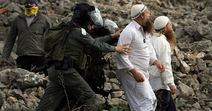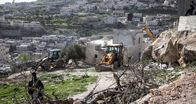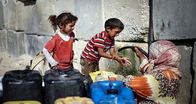21 dec 2016

The Israeli Ministry of Public Security intends to install a checkpoint in southern occupied Jerusalem to enable Israeli settlers to reach Ein Haniya spring which, in turn, will prevent Palestinians from reaching it.
Hebrew newspaper Haaretz said on Tuesday that Ein Haniya spring is located on the Wallaja/Har Gilo road between Jerusalem and Bethlehem.
In the past few months, Jerusalem Development Authority, Antiquities Authority, Nature and Parks Authority, and National parks were carrying out archaeological excavations in the place. As part of the excavations, ponds were drained and streets were built and an old building was renovated into a restaurant.
Hebrew newspaper Haaretz said on Tuesday that Ein Haniya spring is located on the Wallaja/Har Gilo road between Jerusalem and Bethlehem.
In the past few months, Jerusalem Development Authority, Antiquities Authority, Nature and Parks Authority, and National parks were carrying out archaeological excavations in the place. As part of the excavations, ponds were drained and streets were built and an old building was renovated into a restaurant.
10 dec 2016

Israeli settlers demolished an under-construction house in the town of Silat ad-Dhahar, south of Jenin, on Saturday while other settlers seized a water well in the village of Madma near Nablus.
Jihad al-Zabidi, an employee in Silat ad-Dhahar municipality, said, “A group of Israeli settlers demolished an under-construction house near the evacuated settlement of Homesh”.
“The settlers demolished the house at night”, he told Quds Press, adding that the house is near the settlement where they regularly arrive to practice their religious rituals.
Zabidi said that the owner of the house, Iyad Abu Diyak, was shocked by the destruction that befell his house.
In the same context, Israeli settlers seized control over a water well that the people of Madma village use for agricultural purposes.
Talat Ziada, head of the village council, said that Israeli settlers from Yitzhar settlement stole water from al-Sha’ra well that people use for irrigation purposes.
According to Ziada, the Israeli occupation authorities have been preventing them from approaching the well for years, which make it vulnerable to settlers’ attacks.
Ziada said that he would follow up the issue with concerned authorities in order to stop the settlers' violations, noting that the village was already suffering from poor water resources.
Jihad al-Zabidi, an employee in Silat ad-Dhahar municipality, said, “A group of Israeli settlers demolished an under-construction house near the evacuated settlement of Homesh”.
“The settlers demolished the house at night”, he told Quds Press, adding that the house is near the settlement where they regularly arrive to practice their religious rituals.
Zabidi said that the owner of the house, Iyad Abu Diyak, was shocked by the destruction that befell his house.
In the same context, Israeli settlers seized control over a water well that the people of Madma village use for agricultural purposes.
Talat Ziada, head of the village council, said that Israeli settlers from Yitzhar settlement stole water from al-Sha’ra well that people use for irrigation purposes.
According to Ziada, the Israeli occupation authorities have been preventing them from approaching the well for years, which make it vulnerable to settlers’ attacks.
Ziada said that he would follow up the issue with concerned authorities in order to stop the settlers' violations, noting that the village was already suffering from poor water resources.
7 dec 2016

The Israeli Occupation Forces (IOF) ordered Wednesday a Palestinian citizen in Yatta town, south of al-Khalil, to stop building his house.
Coordinator for the anti-settlements committee in al-Khalil, Rateb Jbour, affirmed that the local resident Zuhair al-Qadi received an Israeli stop-building order against his house.
Speaking to Quds Press, Jbour pointed out that al-Qadi was also forced to demolish a water well used for drinking and irrigation which he had built on his land in Khilat Ghazwa, south of the town.
The Israeli demolition order came under the pretext that the two facilities were built in the Israeli-controlled Area C which makes up more than 60 percent of the area of the West Bank.
Israeli soldiers also seized installations for solar panels in the village of Sousia, south of al-Khalil.
Jbour said that Israel’s practices against Palestinians came as part of its settlement expansion policy in the area.
Coordinator for the anti-settlements committee in al-Khalil, Rateb Jbour, affirmed that the local resident Zuhair al-Qadi received an Israeli stop-building order against his house.
Speaking to Quds Press, Jbour pointed out that al-Qadi was also forced to demolish a water well used for drinking and irrigation which he had built on his land in Khilat Ghazwa, south of the town.
The Israeli demolition order came under the pretext that the two facilities were built in the Israeli-controlled Area C which makes up more than 60 percent of the area of the West Bank.
Israeli soldiers also seized installations for solar panels in the village of Sousia, south of al-Khalil.
Jbour said that Israel’s practices against Palestinians came as part of its settlement expansion policy in the area.
23 nov 2016

The World Bank said in a statement issued Wednesday that Palestinian water resources are critically scarce, and the situation in Gaza is alarming.
Adnan Ghosheh, senior water and sanitation specialist, stated that only 10% of Gaza’s population has access to safe drinking water, compared to 90% in the West Bank or about 85% in MENA in general.
Raw or poorly treated wastewater, which comes from densely populated areas and refugee camps in Gaza, infiltrates the aquifer or goes to the Mediterranean, he said.
As a result, you have a shortage of water coupled with high demand, given the high growth of population now close to two-million, according to his statement.
“So there are issues both with the quality of water and the quantity of water, both are making access to improved drinking water very low.”
Ghosheh pointed out that here are some 150 operators who provide some kind of desalinated water that has been filtered to make it acceptable for drinking and for cooking. It’s more expensive and not an improved source of water, according to our definitions of water clean enough to drink.
“In the past, Israel used to deliver good quantities of water, but the demand has increased with the population growth, and the volume of freshwater provided by Israel under the 1993 Oslo Accords falls far short of what it needs now.”
The issue became more acute about 15 years ago, when water supply and availability quickly deteriorated. This water crisis has already led inhabitants to leave Gaza, he continued.
The World Bank statement revealed that there is also a challenge of access to water in the West Bank.
There are some areas where the daily water consumption per person is of 25–30 liters while the World Health Organization recommends 120 liters per capita per day, mainly because inhabitants of the West Bank are not getting enough water from the supplier, according to the statement.
Adnan Ghosheh, senior water and sanitation specialist, stated that only 10% of Gaza’s population has access to safe drinking water, compared to 90% in the West Bank or about 85% in MENA in general.
Raw or poorly treated wastewater, which comes from densely populated areas and refugee camps in Gaza, infiltrates the aquifer or goes to the Mediterranean, he said.
As a result, you have a shortage of water coupled with high demand, given the high growth of population now close to two-million, according to his statement.
“So there are issues both with the quality of water and the quantity of water, both are making access to improved drinking water very low.”
Ghosheh pointed out that here are some 150 operators who provide some kind of desalinated water that has been filtered to make it acceptable for drinking and for cooking. It’s more expensive and not an improved source of water, according to our definitions of water clean enough to drink.
“In the past, Israel used to deliver good quantities of water, but the demand has increased with the population growth, and the volume of freshwater provided by Israel under the 1993 Oslo Accords falls far short of what it needs now.”
The issue became more acute about 15 years ago, when water supply and availability quickly deteriorated. This water crisis has already led inhabitants to leave Gaza, he continued.
The World Bank statement revealed that there is also a challenge of access to water in the West Bank.
There are some areas where the daily water consumption per person is of 25–30 liters while the World Health Organization recommends 120 liters per capita per day, mainly because inhabitants of the West Bank are not getting enough water from the supplier, according to the statement.
